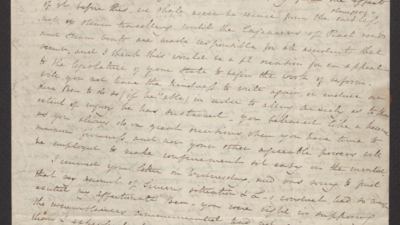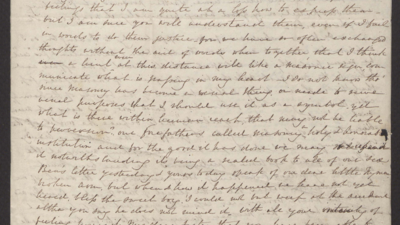Oral History Interview with Lillian Wishnefsky
Title
Date
Contributor
Summary
Lillian Wishnefsky, née Kupferberg, was born in Sosnowiec, Poland in December 1929. Her father was a merchant and her mother a professional pianist. Her family observed the Jewish holidays. She attended public school until fourth grade when Germany invaded Poland in September 1939. She describes the formation of the Sosnowiec Ghetto in 1941, the confiscation of her father’s factory, her clandestine education, life in the ghetto, her family’s move to the Srodula Ghetto; her mother obtained false papers and was hidden by Christians. She describes the Nazis taking her father in the middle of the night, murdering her grandparents and deporting her to a camp and later Auschwitz.
Even though she was only 12 ½ years old, she was not sent to the children’s camp in Auschwitz but was instead assigned to forced labor. Her barracks were across the street from the gas chambers. One and a half years later she was sent on the death march to Ravensbrück. She was part of a prisoner exchange arranged by President Roosevelt and traveled to Sweden via Denmark. She describes her experience on a Swedish farm and her move to Stockholm which was precipitated by a Swedish publishing company’s interest in her diary. She moved to the United States in November 1545.
none
More Sources Like This
of
Werner Glass
Werner Glass, born in 1927, the youngest child of a Berlin pediatrician, emigrated to Shanghai in 1933 with his family and governess. His father, a founder of the Shanghai Doctors Association, practiced medicine in the family’s apartment in the International Settlement. A comfortable life, with many Chinese servants, is described. Werner attended German and English schools, technical college and a French-Jewish university. A vignette relates student resistance to Japanese occupation.
In 1938, his father’s passport was not renewed and the family became stateless. An influx of German refugees, including his grandparents, led to the formation of the JüdischeGemeinde; he details refugee support by the “Joint” and the Sephardic community. He describes his religious education, his Bar Mitzvah in 1940, and his activity in a Jewish Boy Scout troop.
After Pearl Harbor, enemy nationals were interned in a Japanese POW camp, and a ghetto was established in Hongkew for all post-1937 refugees, both Jews and non-Jews. The Glass family, as stateless immigrants who arrived in 1933, were unaffected. In 1942, they were dispossessed by a Japanese officer and moved into one room in a hotel occupied by Chinese and Russian prostitutes. Difficult living conditions, Japanese rules of conduct and penalties for infractions are depicted.
Werner emigrated to the United States in 1947, sponsored by his sister Helga who married an American-Jewish soldier. He completed graduate studies in Chemical Engineering at Syracuse University, married and fathered several sons.
of
Jenny Isakson Sommer
Jenny Sommer describes her life, education, and Zionist activities in prewar Libau, Latvia in great detail, including some incidents of antisemitism and discrimination. In 1940 conditions for Jews started to get worse. Because her family was upper middle class they lived in fear of the NKVD (Soviet Secret Police) and the Russians.
Jenny describes life under the German occupation of Libau in great detail: the execution of all able bodied Jewish men on July 22, 1941; a mass execution of Jews, including her relatives, and how her sister managed to rescue them just before they were to be executed during an Aktion. She witnessed a mass execution of Jews, including her relatives. The Christian superintendent of her uncle’s house hid Jenny and her remaining family in the attic until the round-up of Jews was over. Jenny, her mother and her sister, moved into the ghetto with about 600 other Jews and worked for the Germans as slave laborers. Her sister worked as a nurse in the ghetto. Some Christian Latvians smuggled food to them.
On Yom Kippur night they were taken to Kaiserwald concentration camp, near Riga. Jenny describes their arrival at Kaiserwald, where mothers were forcibly separated from their children. Some women committed suicide. Her sister carried a bottle of cyanide pills. While in Kaiserwald, Jenny did hard labor as part of a Kommando, at a work camp, and later inStutthof. She describes their horrible existence in Stutthof and how she managed to find the will to survive. Her husband worked at Stutthof as an electrician and managed to survive a typhoid epidemic.
As the Russian army approached, the inmates were shipped out of Stutthof on a designated typhoid boat. It was bombed, set on fire and capsized. She was rescued by a German fire boat after ten days without food or water, liberated two days later in Kiel, Germany by English forces. She stayed at a field Lazarett (hospital) in Itzehoe, near Hamburg for six months. She talks about her post-liberation experiences in a German hospital, and finding her husband in Neustadt.
of
Lilly Friedman
Lilly Friedman, née Lax, was born in Zarica, Czechoslovakia on January 20, 125. Her father taught Hebrew. Lilly describes how Jewish life and her relations with non-Jews changed after the Hungarian occupation in 1939. In 1944, after the Germans rounded up all the Jews, Lilly and her family were sent to Auschwitz. She describes arrival in Auschwitz, the selections, and brutal murders of infants. After three days she was taken to Plaszow, Krakow with a group of girls for forced hard labor under brutal conditions. In September 1944 they returned to Auschwitz. As transports arrived, women and children were taken straight to the crematoria. After three weeks she was put in charge of 400 of the healthiest girls who were selected to work as weavers in a factory in Neustadt.
As the front came closer, the camp was evacuated. The girls were transported to Mauthausen and then marched to Bergen-Belsen. She gives a graphic description of the transport to Mauthausen by train under Allied bombardment, the casualties and their attempts to help each other. She describes terrible conditions in Bergen-Belsen and how the girls helped each other to survive. They were liberated by the English Second Army April 15, 1945. She slowly regained her health and met and married another survivor. The family came to the United States in March, 1948.
Her daughter, Miriam adds her insights about growing up as a child of survivors. Lilly mentions the impact living through the Holocaust still has on her and her sisters.
Interviewee: FRIEDMAN, Lilly Date: April 21, 1985
of
Anatole Gorko
Anatole Gorko was born in Lodz, Poland on June 28, 1907 of well-to-do Zionists. He worked in his father’s spinning factory until 1939, when Germany invaded Poland. He fought in the Polish Army for three weeks. After being in the Reserves, he was taken to a prisoner of war camp for a few weeks. He found himself with his family in the center of the Lodz Ghetto in January 1940 and describes the life there. He worked as head cashier for the ghetto stores until August 1944.
He and his family including his wife and child were finally deported to Auschwitz, in cattle cars, where, in the presence of Mengele, only he and his brother-in-law were selected for work and the rest of the family perished. He describes the train ride, arrival, selection, and shaving. He remained there for one month, then pretended to be a mechanic and was selected for a camp in Sudeten where after two weeks of training he worked on V2 rockets. Here he managed to sabotage, and persuade other workers, including German mechanics, to sabotage the work. He worked there from September 1944 until May 1945 when the Russians liberated the area. He made his way back to Lodz where he remarried, became head of the textile production for Communist Poland, but decided to leave. He smuggled himself and his wife to Munich, and waited from 1946 to 1948 to obtain necessary papers to resettle in the United States. He describes in some detail his adjustment to the United States.

Rebecca writes about her brother Benjamin's recent travel accident, the on-going Gratz - Cohen family legal dispute, her own legal suit, her intellectual interests at the moment, new housing for friends, the missing delivery of household goods, and news of the health and death of various family and friends.
